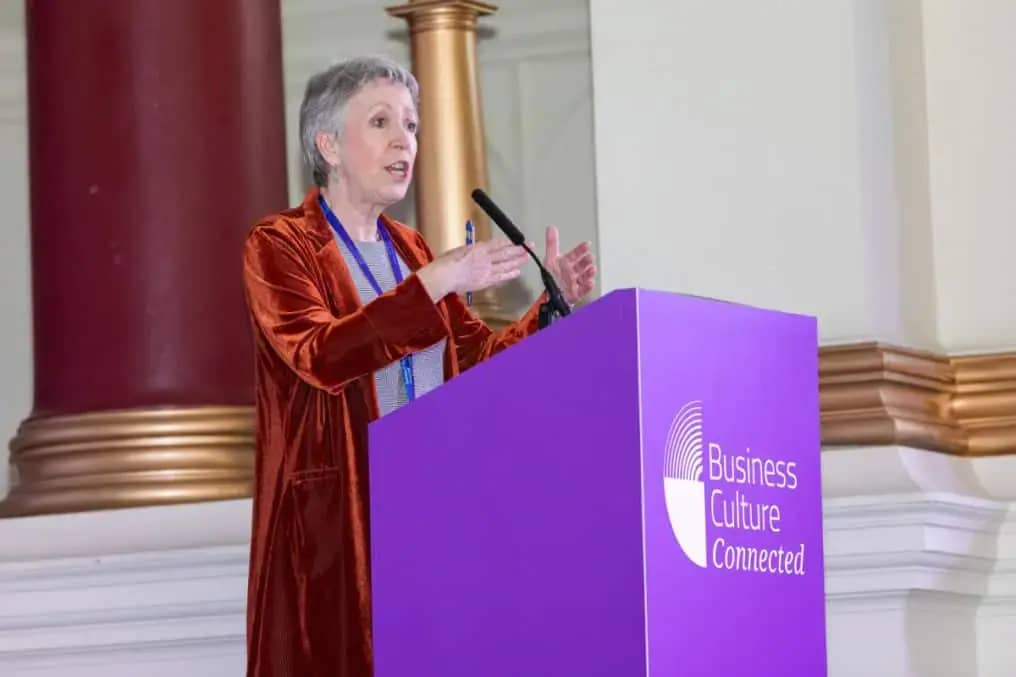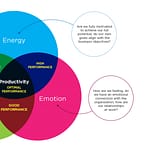Business Culture Connected, May 2024 – an Engage for Success Engagement sponsorship

As I walked into the Great Hall at BMA House, I couldn’t help but gasp at the beautiful room that was the setting for the 9th annual Business Culture Connected Conference. I settled down in the front row, laptop open, poised to listen to the curation of speakers, panellists, industry experts and in-house practitioners, who were about to share their insights on the conference’s theme of ‘delivering productivity and performance’.
Engage for Success’ Jo Moffatt opened the event and set the scene by highlighting that almost all businesses are going through some kind of transformation programme and she asked how do we deliver the transformation and, at the same time, bring our people on the journey – getting them to understand, embrace and change with us.
Jo also highlighted some of the key findings from the 2023 EfS Engagement Survey:
- Employee engagement levels have remained static compared to 2022, although a key differentiator is that those employees who felt leaders put people issues at heart of the operations, are disproportionately more engaged (77% vs 45%).
- In today’s society where information is readily shared and at our fingertips, toxic leadership can be very easily exposed. RedBull and Brewdog are recent examples that she cited. This places all the more importance on ensuring that leaders are authentic and lead with purpose.
Perry Timms’ keynote address set the stage perfectly by introducing HR 3.0 as a transformative operating model for navigating the complexities of the turbulent twenties. Emphasising the shift to an era of human-centred work, where new sources of data and AI can help organisations move from measuring employee productivity to human performance.
Perry likened HR today as ‘Everything HR, everywhere HR, all at once HR’ and stated that this just isn’t sustainable. Instead, he highlighted the imperative of deliberate, diversified, and dynamic approaches in shaping organisational culture and driving performance. HR needs to lead the way by shifting from silo’d functions to a boundaryless discipline integrated with the people, business and community it serves.
Perry also championed not searching for a monoculture but embracing and respecting a culture of cultures, tailored to the needs of local teams and aligned to organisational values.
Throughout the day, speakers referred back to Perry’s address and the various facets of HR 3.0, offering their own take, insights and case studies. From Alex Covey’s pragmatic breakdown of agile culture at AXA to Premal Patel’s exploration of upskilling and reskilling in the face of technological disruption, each session underscored the importance of adaptability, continuous learning, and purpose-driven leadership.
Notably, discussions revolved around the need to align personal, leadership, and organisational values to create positive cultures. Speakers emphasised the significance of purpose in driving decision-making, employee engagement, and organisational success. Practical examples, such as Gail Atkins’ case study on harnessing autonomy illustrated how co-created cultures and empowered employees can drive performance, particularly in remote work settings. Chris Paton, who drew from his time in the military, highlighted that companies are facing ever increasing complexity and pace, they need to be nimble and able to adapt. To do this, people need to feel empowered, trusted and engaged.
Throughout the event, we were reminded of the critical role of data in measuring and managing culture effectively. Adrian Walcott’s session underscored the importance of moving beyond anecdotal insights and leveraging data-driven approaches to understand and nurture organisational culture.
The many panel discussions emphasised the importance of emotional intelligence, deep listening, and breaking down silos to prepare for the future of work and create vibrant cultures. I particularly enjoyed the ‘leading with purpose for organisational success’ panel. We were reminded not to fall into the trap of thinking that purpose is generational – Gen Z may be values-led but engaged older employees are just as likely to prioritise values alignment too.
Natalie Hailey said that “purpose is nothing without people driving it”. To that end, it’s important to continue to have open, honest and transparent communications that reinforce how you’ve arrived at your company’s purpose and culture. Natalie also emphasised that taking an on-going, culture-first approach to decision making is crucial for success as it anchors everyone to the purpose.
The day ended on a high with a presentation on reskilling and flexible working from Rebekah Heaven. Rebekah shared how Standard Chartered Bank is taking employees from sunset roles (likely to be replaced by technology in the future) to sunrise roles (new roles that will emerge) through a reskilling programme, which focused on creating a growth mindset and igniting a passion for learning within the organisation.
It was refreshing to also hear the approach Standard Chartered Bank is taking to hybrid working, which is steering clear of mandates and instead adopting a coaching ethos of trust, accountability and psychological safety. She says that the key to success is taking a WE not ME mindset, which balances client, business, team and personal needs.
This led beautifully into a wrap up from Jo, as she shared some more EfS engagement survey findings specifically on hybrid working:
- 58% of employers are supporting hybrid working for people
- 12% are encouraging return to office
- 9% are mandating for part of the week
- 21% mandatIng it for the entire week
The impact on people’s engagement:
- Status quo engagement is at 62%
- Orgs mandating return to office engagement is plummeting to 55%
- Orgs that aren’t mandating it above the line at 64%
- Orgs mandating a return to office, where engagement levels are below average, 19% of workforce are recording unmanageable levels of job stress
- Where it’s not mandated, only 9% are reporting unmanageable job stress
Overall, the event provided attendees with actionable insights and strategies for thriving in the HR 3.0 era. By embracing purpose-driven leadership, encouraging accountability and autonomy, adopting a culture of continuous learning, and leveraging data-driven approaches, organisations can adapt and succeed in the ever-evolving workplace landscape.
Author: Jo Coxhill, IC, EX and Culture Consultant, Vision 29
LinkedIn: https://www.linkedin.com/in/jocoxhill/





